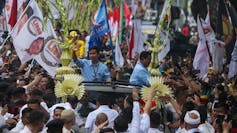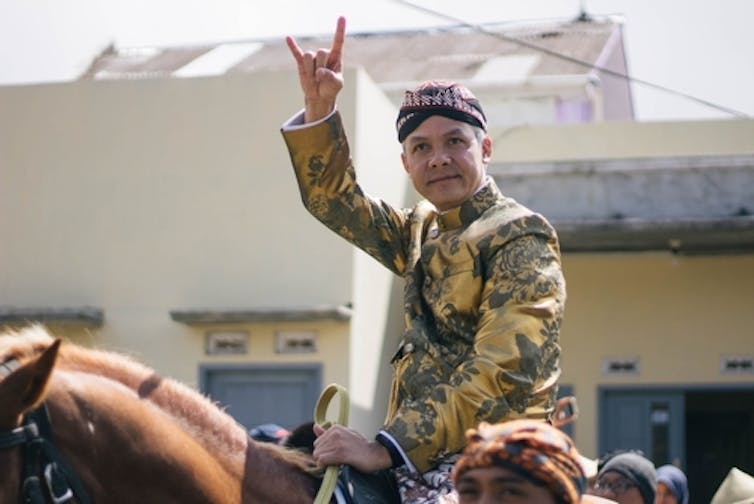The three candidates running in Indonesia’s presidential election – Anies Baswedan, Ganjar Pranowo and Prabowo Subianto – are in the last week of campaigning before the February 14 poll.
As current President Joko “Jokowi” Widodo approaches the end of his second term in office, questions about the trajectory of Indonesia’s foreign policy have also emerged, particularly whether his successor will continue or change the country’s relations with China, the US and its neighbours.
The professor, the general and the populist: meet the three candidates running for president in Indonesia
Continuing the tradition of his predecessors, Jokowi has emphasised Indonesia’s “free and active” foreign policy, a peace-promoting and non-alignment approach introduced in 1948 by the country’s first vice president, Mohamad Hatta.
In 2022, Jokowi attempted to be a peacebroker in the Russia–Ukraine war. He visited both countries and invited Ukraine to attend the G20 summit in Bali.
At a regional level, the ASEAN bloc, under Indonesia’s chairmanship this year, is trying to maintain a neutral relationship between the United States and China, continuing to prevent any potential conflicts from arising and ensuring regional stability.
So far, the three presidential candidates running in this year’s election have said they will maintain Indonesia’s “free and active” foreign policy tradition. But are there any areas where they differ?
Anies: no more pragmatism
Anies is an academic-turned-politician and former governor of Jakarta, who was widely believed to be backed by Islamist conservative groups during his governorship election campaign.
When presenting his foreign policy platform, he criticised the government’s current approach, calling it “excessively pragmatic and transactional”.
After Jokowi secured the presidency in 2014, he departed from his predecessor’s policy of embracing multilateralism, which he believed had brought little benefit to the Indonesian economy.
This is why he decided not to attend several prestigious international forums and focused more on economic diplomacy and improving bilateral relationships with countries, thinking this would bring more economic benefits to Indonesia.
In contrast to Jokowi’s pragmatic approach, Anies wants to “globalise” Indonesia by taking more leadership roles in addressing global issues. His foreign policy would focus on elevating Indonesia’s role and participation in international affairs and the global order.
For example, Anies wants Indonesia to be a front-line leader in ASEAN to ensure a peaceful and stable Indo-Pacific region for the long term and make ASEAN the centre of dialogue between major powers.
Prabowo: good-neighbour policy
Prabowo was a general in the Indonesian military during former President Suharto’s authoritarian era. He was Jokowi’s rival during the 2014 and 2019 elections, but they have since become allies. Prabowo is running with Jokowi’s son, Gibran Rakabuming Raka, in next month’s contest.
Under his foreign policy platform, Prabowo has pledged to sustain Indonesia’s “free and active” foreign policy while strengthening the country’s defence.
This foreign policy direction may have been widely expected, given his military background and current position as minister of defence.
But similar to Anies, Prabowo’s approach also focuses on Indonesia’s role in regional stability. He wants Indonesia to be “a good neighbour” and maintain stable relationships with its neighbours in Southeast Asia.
He would also likely continue Jokowi’s foreign affairs approach of being reluctant to choose sides in the global superpower rivalry.
Prabowo has emphasised how Indonesia must respect the US and its western allies, as well as China. He has also mentioned how India and Russia are important partners for Indonesia, as well as African countries that share the same colonisation experience.

Prabowo is the only candidate who deliberately and openly discusses the importance of being a good neighbour. Under his leadership, Indonesia would therefore need to show that its presence in the region is non-threatening to neighbouring countries.
Ganjar: redefining a ‘free and active’ foreign policy
Ganjar is the former governor of Central Java, Indonesia’s second-largest province, and is endorsed by the country’s largest political party, the Indonesian Democratic Party of Struggle (PDI-P).
Ganjar’s foreign policy platform focuses on four pivotal global issues: the regression of democracy, global inequality, economic decline and escalating conflicts in certain regions.
He specifically draws attention to the intensifying tensions in Asia, pinpointing the worsening relations between North and South Korea, China and Taiwan, and the South China Sea dispute.
Ganjar also aims to maintain Indonesia’s “free and active” foreign policy, but with a slight revamp to align it with the current geopolitical situation and make it more effective. This includes formulating strategies on how Indonesia can be more proactive – not passively responsive – in international affairs.

The platforms of each candidate have provided a glimpse into Indonesia’s future foreign policy trajectory. A continued “free and active” foreign policy will likely prevail, regardless of the upcoming election outcome. However, each contender has also emphasised certain priorities that set them apart.




